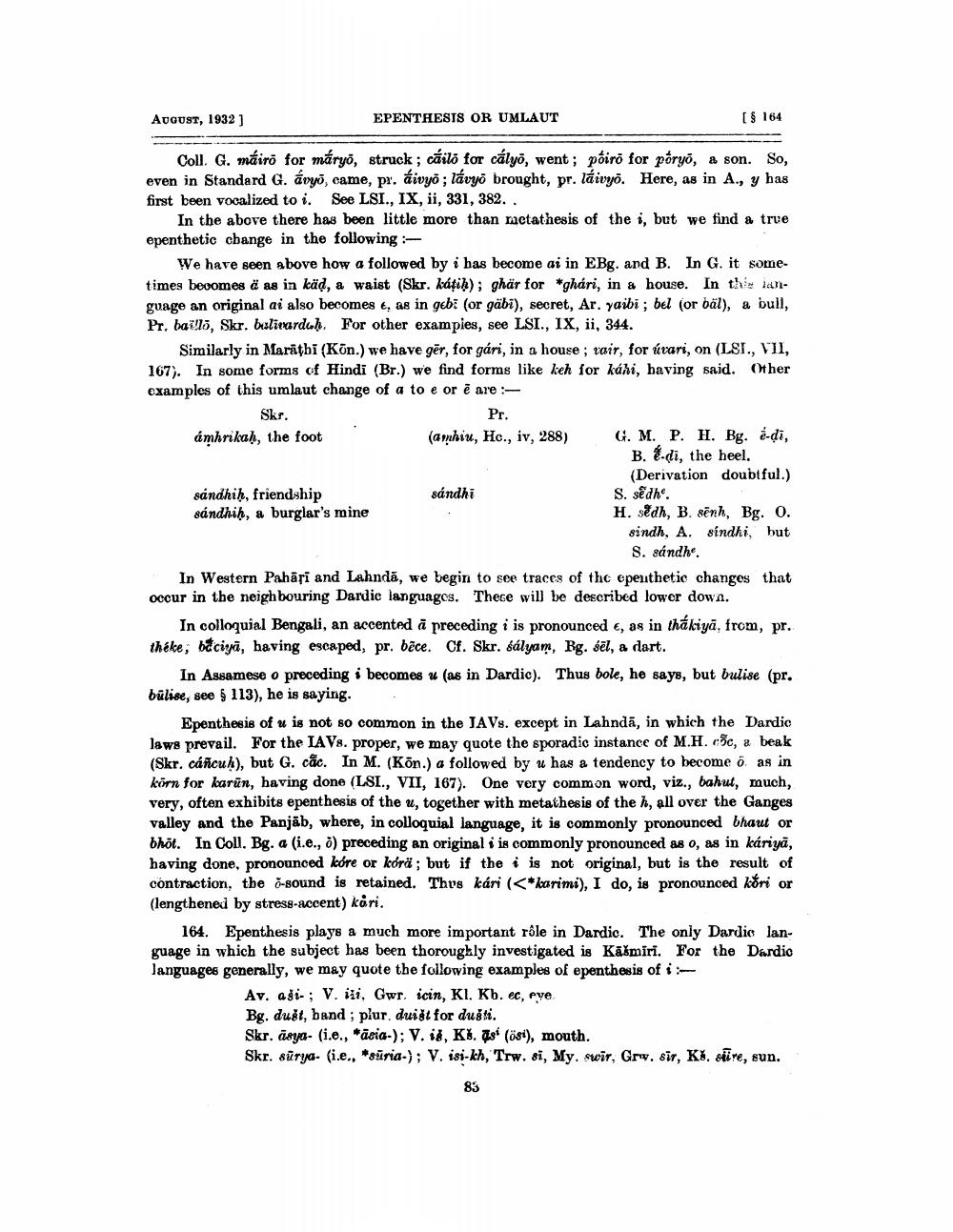________________
August, 1932 ]
EPENTHESTS OR UMLAUT
[ $ 164
Pr.
Coll. G. máiro for máryo, struck; căilo for cályo, went; póiro for póryo, a son. So, even in Standard G. ávyo, came, pr. áivyo; lávyo brought, pr. láivyö. Here, as in A., y has first been vocalized to i. See LSI., IX, ii, 331, 382..
In the above there has been little more than metathesis of the i, but we find a true epenthetic change in the following :
We have seen above how a followed by i has become ai in EBg. and B. In G. it sometimes becomes a as in käd, a waist (Skr. káţik); ghär for *ghári, in a house. In the language an original ai also becomes e, as in gebi (or gäbi), secret, Ar, yaibi; bel (or bäl), a bull, Pr, baillo, Skr. bulinardah. For other examples, see LSI., IX, ii, 344.
Similarly in Marathi (Kūn.) we have gēr, for gári, in a house ; voir, for úvari, on (LSI., VII, 167). In some forms of Hindi (Br.) we find forms like keh for káli, having said. Other examples of this umlaut change of a to e or ē are :
Skr. ámhrikaḥ, the foot
(amhiu, Hc., iv, 288) G. M. P. H. Bg. é-di,
B. &.di, the heel.
(Derivation doubtful.) sándhiḥ, friendship
sándhi
S. sê dh'. sándhih, a burglar's mine
H. sedh, B. sēnh, Bg. O. sindh, A. sindhi, but
S. sándhe. In Western Pahāri and Lahndā, we begin to see traces of the epenthetic changes that occur in the neighbouring Dardic languages. There will be described lower down.
In colloquial Bengali, an accented å preceding i is pronounced e, as in thákiyā, from, pr. theke; b&ciyā, having escaped, pr. bēce. Cf. Skr. sályam, Bg. sēl, a dart.
In Assamese o preceding i becomes w (as in Dardic). Thus bole, he says, but bulise (pr. būlise, see $ 113), he is saying.
Epenthesis of u is not so common in the JAVs. except in Lahndā, in which the Dardio laws prevail. For the IAV8. proper, we may quote the sporadic instance of M.H. cc, a beak (Skr. cáncuh), but G. các. In M. (Kön.) a followed by u has a tendency to become o as in körn for karūn, having done (LSI, VII, 167). One very common word, viz., bahut, much, very, often exhibits epenthesis of the u, together with metathesis of the h, all over the Ganges valley and the Panjāb, where, in colloquial language, it is commonly pronounced bhaut or bhot. In Coll. Bg. a (i.e., 7) preceding an original i is commonly pronounced as o, as in kariyā, having done, pronounced kóre or kórä; but if the i is not original, but is the result of contraction, the o-sound is retained. Thus kári (<*karimi), I do, is pronounced kóri or (lengthened by stress-accent) köri.
164. Epenthesis plays a much more important role in Dardio. The only Dardie language in which the subject has been thoroughly investigated is Kāšmiri. For the Dardio languages generally, we may quote the following examples of epenthesis of i:
Av. aši- ; V. iii, Gwr. icin, Kl. Kb. ec, eye Bg. dušt, band ; plur. duidt for dušti. Skr. asya- (i.e., *acia-); V. is, Kš. Asi (ösi), mouth. Skr. sūtya- (i.e., *sūria.); V. isi-kh, Trw.si, My. Swir, Gry, sir, K. stire, sun.




